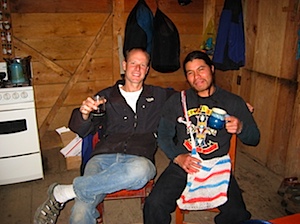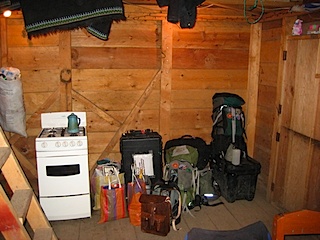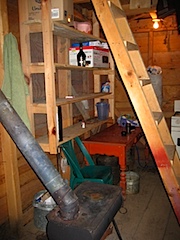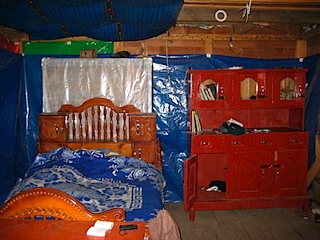Our last week in site passed so quickly it’s difficult now to sort out the details. It felt like that week was actually almost two weeks of constant activity packed into the space of about two days. Saying good bye started on our way home from the fourth of July party, though I think the reality of the situation hit me with the absence of good byes to our friends who’d left in June, who we didn’t really even get to say, “See you later”, and subsequently what felt like a sudden void at the actual party. There was the Last Supper in Huehue with our friends who are not yet done with their service. Then we rushed home to start the tedious task of packing in the twenty four hours we had before the three trainees showed up. We sorted piles: things that go back to the training center, things that stay in our house, things that go back to the US, and finally the fire pile. I refused to take anything off the walls until the trainees had come and gone. I wanted our house to feel like a home. So they arrived and our good byes really got a jump start as we combined welcome and going away parties into one.
First, there was a party in the house of Lucia and Pedro. She was the nurse in our village and her brother Pedro was our Q’anjob’al teacher. They were perhaps the two most helpful people in our two years of service, always going above and beyond what common courtesy requires, to help us out and make our lives easier. Because it was a welcome party for the three girls and because Lucia and Pedro invited our good friends Nico and Katal (who also study Q’anjob’al with Pedro) as well as our boss Basilio (who was in town for the project inauguration in Yulais the following morning), it was quite a mix of emotions. I realized how strange it was that here sat these three women that were going to be spending the next 3 days in our home, and yet I’d never really get to know them, at least not here. And then it hit me that I was supposed to be saying good bye to Pedro and Lucia and their adorable elderly parents and their wonderful children and Pedro’s very shy but kind wife, Carmen. Pedro’s daughter was about two weeks old the first time we came over to talk about whether or not Pedro was interested in being our teacher. She now calls me Amali and chatters and smiles constantly. She even had a conversation with me over the phone entirely in Q’anjob’al a week or so before the party. I guess we’ve both learned a lot in two years.
Everyone gave small speeches and presents. Lucia’s son Ronald sang a song in Spanish where the chorus translates to, “Don’t cry, blue eyes. Blue eyes, don’t cry,” and he read us some of his poetry. They gave us gifts, a wooden marimba, a crucifix of the Black Jesus of Esquipulas which is a popular pilgrimage site for Guatemalan Catholics, and a set of small carved wooden cups. I’d knit them fingerless handmits, Lucia a matching scarf and Pedro a matching hat. I apologized for not being able to knit something for everyone in the family, but Ronal tried his mother’s handmits on and promptly declared, “They’re unisex!” Hah. We all did cry a little, but at that point, it was all still a little unbelievable. We got home late from our dinner in town, which necesitated the rental of a private van to take us home in the dark. Being out after dark is such a rare thing here. It’s always indicative of something out of the ordinary. At this point, we’d really given up on the idea of feeling rested at all until we were no longer in the village. The next morning we had to make and eat breakfast, clean up, dress up, and head to Yulais for the long awaited party.
The inauguration in Yulais was really beautiful. Basilio drove us down the dirt road… what service after two years of walking! And the community leaders all greeted us at the car to lead us to the festivities. I’d assumed we’d celebrate in someone’s house, but that wasn’t the case. We made our way to the tiny red dirt basketball court on an outcropping the looks over the valley in the direction of Santa Eulalia. The court was covered in pine needles, the sign of a party, and the place was packed. I almost burst into tears as I passed all the women lining the hill on the way to take our seats. I knew pretty much everyone there. I’d been in their homes. I’d shared meals and work and a lot of health talks and whole lot of laughter with this community. From the moment I stepped out of the car, men and women and children would shake my hand or hold it and smile and say, “Watxili, watxili.” telling me I was beautiful in my traje. The weather too had started out rather watxili that morning, but clouds were approaching. I just hoped the rain would hold off long enough for us to get through the ceremony.
We sang the (world’s LONGEST) national anthem one more time, listened to speeches all around, handed out diplomas, posed for pictures, watched children’s presentations, received presents from the community–red handkerchiefs tied around our necks and traditional straw hats– and of course, no party is complete until we’ve danced a few rounds of marimba; there were raindrops here and there, but no downpour. After the ceremony came the food. We piled into Deigo’s house, full of tables and chairs no doubt brought from all the surrounding neighbor’s houses for the day. The food was served and the rain let loose, but we were all safely inside.
Piles of tamales and bowls of chicken soup were depleted, the conversation slowed. It was time to go. Basilio was in a hurry to leave and he was giving Nico and Katal a ride–they promised to come back and say a proper good bye to us when our house was less full of guests. I looked around at the half empty room, made small talk for a time, and then Diego’s wife appeared. She just wanted to tell me thank you, again, but then she grabbed my elbow and her whole body heaved with a sob. She held on and cried for a few minutes. I felt paralyzed and trapped all at once, but somehow we managed to walk to the kitchen together. I looked around the room full of women who’d served us all, finally sitting down to eat laughing and joking amidst dirty pots and dishes, discarded tamale leaves and glass bottles of soda some empty some half full. “Thank you. Thank you all, and goodbye,” I managed to get out before I started to cry too and all the women dropped their utensils and tamales and smiles disappeared as they lined up to hung me one by one, all of them crying.
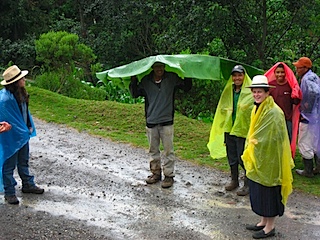 It was pouring still when I emerged from the kitchen. One of the women saw me crying and said, “You don’t have a raincoat. You need a nylon.” I told her it was ok, we’d just walk fast. She didn’t need to get me a plastic sheet to cover myself on the walk home. She walked off to busy herself with a mission. The women outside lined up and hugged me then too, and as I started to walk away, the first woman appeared with a plastic sheet for me and one for Jaime. “Thankyou,” I said, waved, and started my walk home, sobbing on my own and leaving the rest, Jaime and the three trainees, to negotiate their own exits. I dipped down into the soggy cornfield, and when I emerged on top of a hill across the field from the houses the school kids were chanting, “Naq Jaime, Xal Emily, Naq Jaime, Xal Emily!” and waving goodbye. I couldn’t believe this was it, for a good long time. “Take a picture, Jaime,” I said and I turned away crying even harder. I had to go home now. The five of us walked down the gravel road to our house, where I found at least a little respite.
It was pouring still when I emerged from the kitchen. One of the women saw me crying and said, “You don’t have a raincoat. You need a nylon.” I told her it was ok, we’d just walk fast. She didn’t need to get me a plastic sheet to cover myself on the walk home. She walked off to busy herself with a mission. The women outside lined up and hugged me then too, and as I started to walk away, the first woman appeared with a plastic sheet for me and one for Jaime. “Thankyou,” I said, waved, and started my walk home, sobbing on my own and leaving the rest, Jaime and the three trainees, to negotiate their own exits. I dipped down into the soggy cornfield, and when I emerged on top of a hill across the field from the houses the school kids were chanting, “Naq Jaime, Xal Emily, Naq Jaime, Xal Emily!” and waving goodbye. I couldn’t believe this was it, for a good long time. “Take a picture, Jaime,” I said and I turned away crying even harder. I had to go home now. The five of us walked down the gravel road to our house, where I found at least a little respite.
The next morning Lucia called us and asked if we could come to the health post for a little bit, so we tied on our boots and slogged through the ever present mud to the health post. We were called into one of the examining rooms where a small delegation of about six women waited for us. The women of our community wanted to tell us thank you and goodbye. Apparently they’d planned to present gifts to us at a meeting the week before, but since no one had managed to inform us that our presence was requested at a meeting on Monday morning, we inadvertently missed our community farewell. While on the bus leaving Huehue on our way home from the fourth of July, Lucia called to ask us if we were home or not. We told her we were on the bus and she sounded incredibly disappointed. The women had gathered at the school to give us presents and send us off.
Because we’d missed the party 4 day earlier, this group of women had come on behalf of the community to present us with recuerdos , which literally means a remembrance but is also means souvenir, of our time in Guatemala (like we are at all in danger of forgetting). Lucia translated to Spanish for us as the women thanked us for our time, for our health talks, and for sharing in their lives and their community for two years. Some said they were sorry we weren’t able to do more, and I told them, “That’s why Catalina is coming, to help you do more the second time.” 🙂 They gave me a traditional Santa Eulalia corte, a simple design with bright red as the main color and thin, vertical stripes of blue and green and black and white. They gave Jaime a small hand woven bag, and then apologized that “women are easier to shop for” and gave me another present, a huipil, a traditional top to wear with my corte.
It was a heartfelt presentation. They didn’t want to let us leave without letting us know that they appreciated us, which was very kind. The purchase of a corte is no small thing, which means many many women must have contributed a few quetzalitos each. It did make me a little sad, that even our good bye was indicative of our struggles against a total lack of organization and communication in and with our village. I’m just glad that they really did seem to get something from all of the work. I honestly believe, in spite of all challenges and difficulties there, that the women benefited from the health education talks, if in no other way except that they’ve heard new ideas, even if they don’t entirely understand or believe them. The idea is now out there, and there’s a new volunteer coming to reinforce and expand on the small things we were able to accomplish. It was hard to say goodbye here too.
The next day we said goodbye to the trainees who would be back in short order to take over this whole operation. And with their departure we knew that we had but a few days left in the village. Jaime accompanied them into town to show them around and introduce them to helpful store owners before making sure they found their bus back south. I fixed a cup of coffee and stared out the window for a time, knowing there wouldn’t be many more moments like this. Then I set to work taking down and packing up. First, the wall of drawings. I should have taken a picture of how full the wall was at the end, drawings from nieces and nephews and the children of friends in the states, photos of our families and friends and drawings upon drawings done bye Chalio, Alberto, and plenty of neighborhood kids. All alone for the first time in quite a while, I started crying, pulling out tacks and thinking about how the picture of the twins on the wall was ridiculously outdated and how each of my sisters’ kids have grown, and that next to the richness of the friendships we cultivated with all the kids here. That one wall really said a lot about how big our world is. Since lots of drawings were placed above the stove they were spattered from cooking and crinkled by the heat that escaped the oven. We couldn’t consider taking all of them home, but we did scan our favorites. The we hid them and quietly put them in the wood stove the following evening so the kids thought that they all went into our a luggage. It was only a tiny deception with the best of intentions.
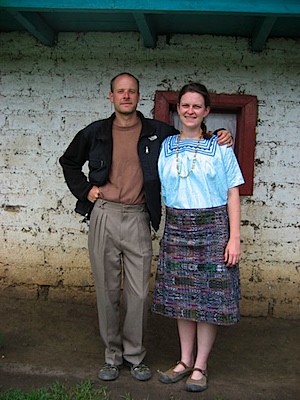 Thankfully our boss took most of the books, tools, and clothes for the freebox at the center when he left. Even so, we had a mountain of stuff to figure out how to pack. And, as though time weren’t already an issue, our house turned into the most popular stop in an endless parade of folks from all over. Yulais sent their resident tailor to take our measurements. A day later the tailor came back with a pair of pants that fit Jaime to a T, and a skirt that did not fit me at all. He said sorry, he’d forgotten to write down one of the measurements that I took. Then he said, also you told me to measure higher up and now you want it to fit lower down. And then he continued to repeat that last sentence so much that it was hard for my overly-stressed and under-rested self not to flip out and ask him to leave the house. We were, after all, trying to pack. I tried to just keep smiling and be gracious. He came back the next day with a skirt that did fit me, mostly. This was an additional gift from a small group of families in Yulais.
Thankfully our boss took most of the books, tools, and clothes for the freebox at the center when he left. Even so, we had a mountain of stuff to figure out how to pack. And, as though time weren’t already an issue, our house turned into the most popular stop in an endless parade of folks from all over. Yulais sent their resident tailor to take our measurements. A day later the tailor came back with a pair of pants that fit Jaime to a T, and a skirt that did not fit me at all. He said sorry, he’d forgotten to write down one of the measurements that I took. Then he said, also you told me to measure higher up and now you want it to fit lower down. And then he continued to repeat that last sentence so much that it was hard for my overly-stressed and under-rested self not to flip out and ask him to leave the house. We were, after all, trying to pack. I tried to just keep smiling and be gracious. He came back the next day with a skirt that did fit me, mostly. This was an additional gift from a small group of families in Yulais.
On Saturday, Katal and Nico came to say goodbye. One last time, they got to enjoy our electricity and internet access. We left them at home to really soak it up as we went to Don Ximon’s house for a last dinner with his family. We had pictures my dad sent from their visit to drop off with the family, and a few days before we’d agreed to come at 6pm. I think we arrived at 6:10 and were greeted with smiles and hellos and then, “We thought you weren’t coming…” I never get over how ready everyone is to be let down. It has nothing to do with us; it’s just the way of things here. We proceeded to eat the most delicious chicken we’d ever had. Don Ximon talked to us in his usual quiet, deliberate voice, which was challenging to hear as rain pummeled the tin roof through most of dinner. He talked to us about how he was grateful we’d come, that our parents had come to visit his community, that we’d done so much work with the women in the community. Then he talked extensively about the Manuel problem. He reassured us that there has never before been a community leader this bad in the community. Over the last few months, leaders from various committees have started talking and realized that Manuel fleeced everyone. He made up stories and demanded money with a voice of authority that compelled everyone to hand it over to him, and it all disappeared, hundreds and hundreds of quetzales. Everyone is pretty unhappy with him, but we don’t see it or hear it. It’s this quiet vibration that runs through gatherings and official meetings, but in their reserved and overly polite way, it’s rarely talked about. Don Ximon assured us that people didn’t think we were lazy. Now every one knows where the problem lies. Still, I don’t think they know exactly what to do about it, but they have their new committee and a new volunteer on the way. They’re working on it, slowly, quietly, steadily.
The rain stopped just in time for us to say our good byes and walk home dry. There, Nico and Katal were waiting with freshly baked ambassador brownies. We pulled boxes out from under the bed and filled them with fancy cooking supplies left over in our stash, a few kitchen utensils they lacked. It was a little like Christmas, sending them home with yoga mats and for a time we thought they were going to take the Christmas tree itself. Funny how that first year when we were out in Santa Eulalia all alone seems like such a distant memory. It was fun to have friends so near by the whole last year. We like those two a lot, and wish them well in their last year of service. We will probably have to send them a care package in a month or two.
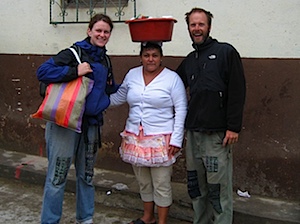
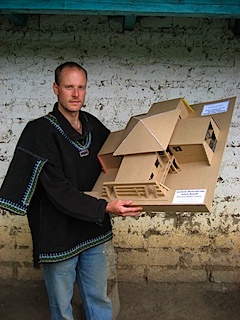 On Sunday we rode into market together. One last time to the market, and to say goodbye to friends in town, our favorite shop owners, the cheese vendor Blanca, who comes from out of town only on Sunday to sell the best queso fresco, and folks from the teachers’ school. The latter actually invited us out to lunch, and Jaime presented them with the finished model of the new building for their school, to help with fundraising. We had a great conversation about cultural preservation and the importance of bilingual education. Volunteers to the very last minute.
On Sunday we rode into market together. One last time to the market, and to say goodbye to friends in town, our favorite shop owners, the cheese vendor Blanca, who comes from out of town only on Sunday to sell the best queso fresco, and folks from the teachers’ school. The latter actually invited us out to lunch, and Jaime presented them with the finished model of the new building for their school, to help with fundraising. We had a great conversation about cultural preservation and the importance of bilingual education. Volunteers to the very last minute.
Nico had alerted us that our favorite storekeeper, Antonio, was planning on coming out to visit us on Wednesday or Thursday. Unfortunately, we were moving on Tuesday morning. We went to let him know. He’d always promised to come out to our house and visit; one time he even tried, but that day they were pouring cement on our road and it was closed to traffic. With no way through, he turned around and went home. He’d always wanted to try my homemade bread, and I told him we always have some at the house. On Sunday I brought him a loaf, figuring he’d never make it out.
Monday morning we were making muffins before Jaime went to plant trees. We woke up at six since we really wanted to see and feel and experience our last morning at home. We won’t have a home of our own now for the next few months, so this was important. Antonio called; he was on his way out to visit us. We like this guy because he seems to have a much broader perspective on life than most Guatemalans we know. He’s my age, yet he’s unmarried and has no children. Very surprising in these parts. He lives in town, but he loves being out in the countryside, so twice a week he hikes out to take care of the family’s cows where they own land on the outskirts of the municipality. He invites us into his family’s home (attached to the store) and always fixes us coffee and tea. Although his mother and grandmother are usually there, he serves us himself. On Sunday when he invited us in for coffee, I saw wine bottles on the table. “You drink wine? I thought we were the only people in these parts who hauled that back from the city,” I said. He said he liked to have a glass in the evenings.
So at a little after 7 Antonio showed up. He’d brought us wine as a parting gift. It was going to be a long day, and rough, so we had a glass of wine with our muffins and tea and coffee at 7:30 to show him we appreciated the gesture. I called it my quitapena, which doesn’t translate well, but means that it made me feel a little less stressed and emotionally strung out. Antonio is really great, and although we didn’t have a lot of long talks with him, he was always so kind and helpful that we made a point to drop into his store often just to say hi when we were in town. I didn’t like having to say goodbye.
Jaime planted trees that morning while I took some last minute photos. I went up the mountain to check on the planting and help them out, but it was all men. They didn’t not want me there, but their inability to interact normally around women and their obvious awkwardness led me to head back home before I’d even planted a tree. I was very, very glad it was happening though. I’d told Jaime from the very beginning that we couldn’t burn wood to keep us warm without replanting before we left, especially since we’d given community talks on the importance of planting trees. Jaime helped make it happen.
I spent much of the day doing last minute packing and cleaning and reading the last few books to the kids. I had a packing audience most of the day. Chalio at one point said with a half smile, “I want to go with you.” I think he only meant to Antigua, and not all the way to the states. This kid loves long adventurous drives. He’s been on four in the span of his short life, two family trips to Panajachel and two family trips to pick his father up at the airport. I love that kid. The whole day felt like a buildup to dinner, but we had to move slowly through every minute until then. In the afternoon I baked a chocolate cake, and shortly thereafter we were called into a meeting at Nas’ house with the members of the new Peace Corps comittee that in reality looks almost exactly like the last leaders group, minus Manuel and plus another Juana and Bernabe. The committee had a few questions about the arrival of their new volunteer, but after that everyone started to make speeches. They thanked us for our work and the time we gave to their community. They apologized for all the problems with Manuel. Each one of them spoke, saying mostly the same things, and Nas translated for the few who were more comfortable speaking in Q’anjob’al.
The leaders apologized for not having a real send off party for us. While I think they were speaking the truth, it also felt like they were ushering an embarrassing epoch for their community discreetly out the door. I though about our gloriously hailed arrival, the firecrackers and bombas, roses, the formal dinner. Honestly, they were celebrating what they believed to be the faces of money coming into their community, a promise from the North. I wondered if I was just being naive thinking that this quieter goodbye was a sign that they understood, at least in some small way, that we aren’t the faces of money; we’re just Emily and Jaime. We expected a lot of the community before we gave them anything they could touch or hold. They messed up, and they are embarrased, but not entirely ungrateful. Tears were shed, yet again. But it was a strange hour or so, and we were relieved when it came to an end.
Our last night, just like our first, was spent around the fire in our host family’s kitchen. That first evening, Delmi was not even a year old and I had to learn the Q’anjob’al phrase tz’ebatx nena before she sat stoically on my lap staring straight ahead. On our last night, she was stuck to my side until moments before she fell asleep with her grandmother. I think she knew. Reyna told me the week before she’d been trying to explain our departure to her, but wasn’t really sure how much she understood.
We had soup and tortillas and chocolate cake at the end. But then there were words. Everyone shared their words. It took over an hour, and I never could look at Nas, but there were no dry eyes anywhere else. We gave a children’s book with a little inscription inside to each of the kids; I tried to pick out their favorites (which were quite conveniently all different). We gave our book on the history of Santa Eulalia to Nas to keep (I ordered myself one of the two English copies we could find on Amazon a few weeks earlier). We also left the family with 400 trees and a written statement that our wood burning stove and our gas stove/oven would go to the family after volunteers were done using them.
This evening was the first time we ever talked with the entire family about Galindo’s suicide attempt. Lina thanked us for helping them through that time. Galindo thanked us personally, and told us we’d helped him to grow, to be more mature, and to be more open with people. His sister Lina said we’d helped her talk more to people and share more. Chalio and Alberto’s father thanked us for the short time we’d shared with him since he returned from the US, but broke down into tears telling us thank you for all we’d shared with his sons. Their mother, Gela, cried throughout the whole thing. For two years she’s always apologized and said, through her mother’s translating, how much she would like to talk to us but is so embarrassed about her lack of Spanish. It makes me feel bad that I never got better at Q’anjob’al. Maybe the next volunteers will do better. Reyna, who refused to cry through Galindo’s ordeal, who told me she wouldn’t shed a tear unless he died, god forbid, could hardly speak she was crying so hard. I think she liked that she had the freedom to just be friends with Jaime, in a way that is not possible with any man here. Obviously she and I were also good friends, and the fact that we showered her children with love and adoration and stories and games was something she thanked us for. But really, I feel like we owe them more than we ever gave.
This family has been so amazing. I mean, my family at home has always had an inclusive philosophy. Really, when you start at base 10, what’s one more person? But it moved me further to see that attitude in complete strangers who, on the surface, appear to be have so many more differences than similarities to us. The truth is, they are really much more similar than different. I hope the door to our home always remains wide open for whoever is interested in coming in, sharing a meal, and talking for awhile just like theres was for us.
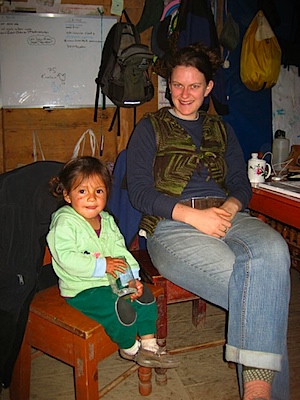 I told the family I’ve never felt so much like a mother in my life, not even to my nieces and nephews at home. From across the cornfield, whenever the wailing wound up like a tornado siren, I could tell in two seconds which child it was. I love them all, especially Michelle and Delmi, but extra especially Delmi. A week or so before we left, the two girls were over at the house and I was reading Curious George Rides a Bike. I burst into tears, unexpectedly, and they looked at me not afraid but just slightly alarmed. I looked at Michelle who always seems to understand what I say even though she can’t respond in Spanish and said, “I’m only crying because I’ll miss you. I have to go home to my family, but I don’t want to leave you either.” She climbed down from the trunk she was sitting on and hugged me. Just for my own sake I continued, “So you’re going to grow up and study hard and be really smart right?” and she said hinye, which means ok. “And you’re always going to be good friends with Delmi and take good care of your mother, right.” She nodded yes and said hinye again. I gave her another hug, and then she said, “Let’s go, Delmi,” in Q’anjob’al and I started laughing. It was as though she was saying, “We gotta get away from this crazy lady!” But honestly, I feel, and this is so cheezy to say, but I feel like they’ve made my heart bigger. They’re innocent and hopeful and so intelligent. It makes me understand in a sense how easy it would be to adopt a child, not talking about paperwork or money, but how really bringing a child into your home and loving him or her all you can would really be kind of easy. It’s like they draw the love out of you, whether you knew it was there or not.
I told the family I’ve never felt so much like a mother in my life, not even to my nieces and nephews at home. From across the cornfield, whenever the wailing wound up like a tornado siren, I could tell in two seconds which child it was. I love them all, especially Michelle and Delmi, but extra especially Delmi. A week or so before we left, the two girls were over at the house and I was reading Curious George Rides a Bike. I burst into tears, unexpectedly, and they looked at me not afraid but just slightly alarmed. I looked at Michelle who always seems to understand what I say even though she can’t respond in Spanish and said, “I’m only crying because I’ll miss you. I have to go home to my family, but I don’t want to leave you either.” She climbed down from the trunk she was sitting on and hugged me. Just for my own sake I continued, “So you’re going to grow up and study hard and be really smart right?” and she said hinye, which means ok. “And you’re always going to be good friends with Delmi and take good care of your mother, right.” She nodded yes and said hinye again. I gave her another hug, and then she said, “Let’s go, Delmi,” in Q’anjob’al and I started laughing. It was as though she was saying, “We gotta get away from this crazy lady!” But honestly, I feel, and this is so cheezy to say, but I feel like they’ve made my heart bigger. They’re innocent and hopeful and so intelligent. It makes me understand in a sense how easy it would be to adopt a child, not talking about paperwork or money, but how really bringing a child into your home and loving him or her all you can would really be kind of easy. It’s like they draw the love out of you, whether you knew it was there or not.
When everyone was finished talking, it seemed like it was time for us to go. Reyna came up to me with a sleeping Nasito and said, “You should give him one last kiss.” He’s such a beautiful, happy guy. I started bawling, and everyone lined up to give us hugs. I felt like I was spinning in circles and a total mess. I ended up walking Reyna and Nasito to their bed in the back of the house and gave him the last kiss he’ll get from me in a while in the exact same place I gave him his first kiss, when he was three days old asleep in the bed he’d been born in. It’s all very circular, very appropriately Mayan. Maybe that will bring some sort of good to him as he grows up.
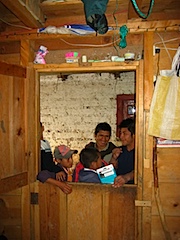 We walked back to our house to really, honestly finish packing and cleaning and storing everything up in the attic so Nas could work on the house after we left and before Catalina came. He wants to add a window to the house and make the existing window bigger; he realized that since we work inside a lot, we made his light bill go up considerably because we couldn’t see anything during the day without the lights on. But packing would’ve been easier if half the family hadn’t followed us to our home. Here people with sit with the dead and dying, they just sit with them without saying a word. I felt sort of like we’re the living soon-to-be-dead, or that this was somehow equivalent to that type of sitting. It made packing very difficult and very frustrating, and the teenage Lina was the last to leave. She left at about 12:30 am. Fletch fell asleep, unable to handle consciousness anymore, at about 1. I was up until 1:30, making coffee for the ride, good Guatemalan french-pressed coffee, so I wouldn’t accidentally sleep through my last ride through the Cuchumatanes. It’s so beautiful up there it sometimes makes my heart hurt. I didn’t want to miss it. Here are the last pictures of our nearly empty house and our MOUNTAIN of luggage. (Fletch is under the covers of the bed, I promise!)
We walked back to our house to really, honestly finish packing and cleaning and storing everything up in the attic so Nas could work on the house after we left and before Catalina came. He wants to add a window to the house and make the existing window bigger; he realized that since we work inside a lot, we made his light bill go up considerably because we couldn’t see anything during the day without the lights on. But packing would’ve been easier if half the family hadn’t followed us to our home. Here people with sit with the dead and dying, they just sit with them without saying a word. I felt sort of like we’re the living soon-to-be-dead, or that this was somehow equivalent to that type of sitting. It made packing very difficult and very frustrating, and the teenage Lina was the last to leave. She left at about 12:30 am. Fletch fell asleep, unable to handle consciousness anymore, at about 1. I was up until 1:30, making coffee for the ride, good Guatemalan french-pressed coffee, so I wouldn’t accidentally sleep through my last ride through the Cuchumatanes. It’s so beautiful up there it sometimes makes my heart hurt. I didn’t want to miss it. Here are the last pictures of our nearly empty house and our MOUNTAIN of luggage. (Fletch is under the covers of the bed, I promise!)
At 3 am we woke up and dressed. There is construction on the road from the top of the mountains down into Huehuetenango city, causing long traffic lines. Our driver Mario wanted us to get through the construction areas before they started closing the lanes at 7 am. Gela, Abel, Chalio and Alberto all spent the night in the room next door instead of going home, just so they could help us load the van and give us one last hug in the “morning”. Teenage Lina also woke up to give us hugs and say one last goodbye. It was pouring down rain and pitch black as we slipped through the mud and down the hill to the van. Since the only pair of shoes I was taking with me have a hole in the sole that makes them wet from the inside out, I wore my rubber boots as I ran back and forth between the house and the road. I called Reyna by phone and said goodbye so she didn’t have to get out of her bed in the pouring rain. Just before the last trip down to the van, I told Abel that if he followed me I’d give him the rubber boots forever. He laughed and grinned his silly grin and followed me down to the van where I put my shoes on and handed him the boots. It felt like we were spiriting away in the night. My last image is that of swaying shadows, two story tall cornstalks illuminated by the van’s headlights and blown up on the side of the house by the road as the wind blew the rain across the mountain. We shut the van door, and we were off.
